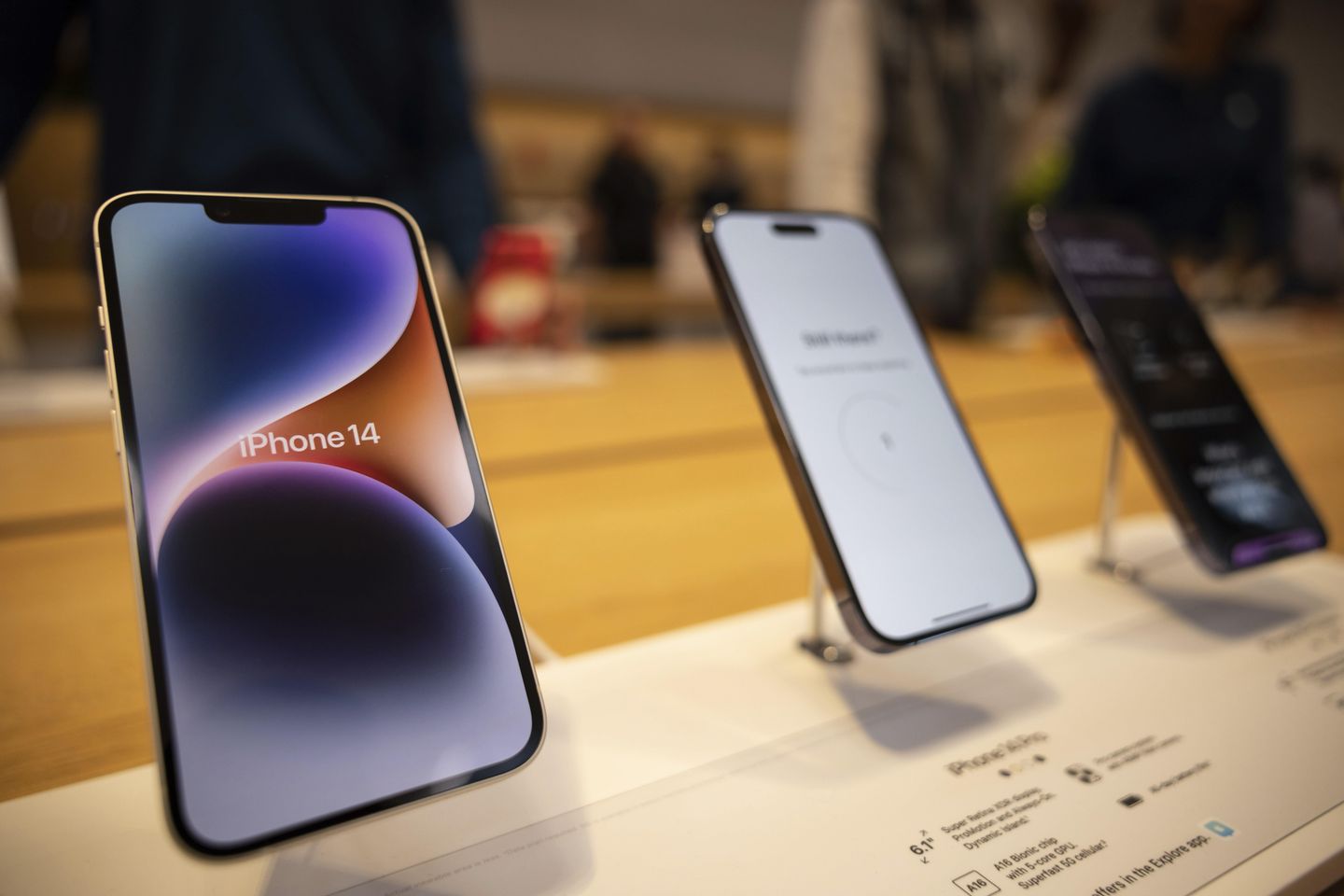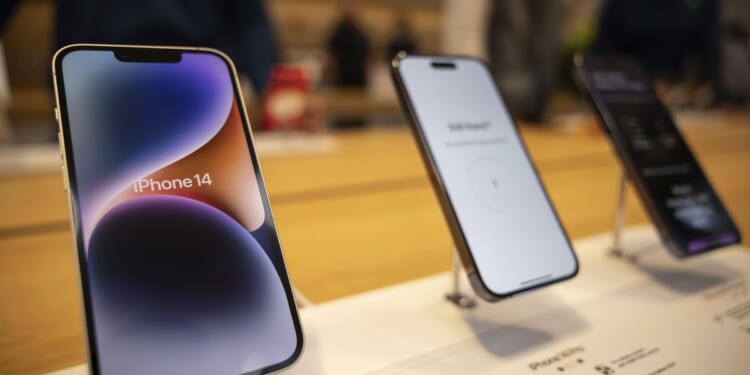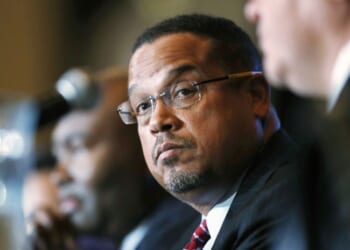
Commerce Secretary Howard Lutnick said the smartphones and other electronics that President Trump has spared from his recent reciprocal tariffs would face “semiconductor sectoral tariffs” over the coming months.
Mr. Lutnick and other administration officials insisted Sunday that Mr. Trump’s trade policy is going as he planned amid criticism that they are making it up as they go along after a week in which his stop-and-go tariffs sent shock waves through Wall Street, triggered a trade war with China and stoked fears of an economic recession.
In the latest twist, the Trump administration on Friday night deemed smartphones, laptops and televisions exempt from the 145% tariffs on China.
Mr. Lutnick said Mr. Trump is developing national security tariffs on pharmaceuticals and semiconductors, including levies targeting the chips inside smartphones, laptops and other electronics, many of which are manufactured in China.
“All those products are going to come under semiconductors, and they’re going to have a special focus type of tariff to make sure that those products get reshored,” Mr. Lutnick said on ABC’s “This Week.” “We need to have semiconductors, we need to have chips, and we need to have flat panels — we need to have these things made in America.”
“We can’t be reliant on Southeast Asia for all of the things that operate for us,” he said. “So what he is doing is he’s saying they’re exempt from the reciprocal tariffs, but they’re included in the semiconductor tariffs, which are coming in probably a month or two.”
U.S. Customs and Border Protection issued a “Reciprocal Tariff Exclusion for Specified Products” rule late Friday that identified 20 electronic products as exempt from Mr. Trump’s reciprocal tariffs.
The exemption provided a reprieve to high-tech giants such as Apple and Microsoft, which manufacture products in China.
On Wednesday, Mr. Trump announced a 90-day pause on reciprocal tariffs on nations other than China because of their willingness to negotiate.
Both moves were seen as a way to reassure the markets after his wave of tariffs rattled Wall Street, wiping out trillions of dollars of wealth.
Mr. Trump also weighed in Sunday, saying, “There “was no Tariff ‘exception’ announced Friday.”
“These products are subject to the existing 20% Fentanyl Tariffs, and they are just moving to a different Tariff ‘bucket,’” he said on Truth Social. “What has been exposed is that we need to make products in the United States and that we will not be held hostage by other Countries, especially hostile trading Nations like China, which will do everything within its power to disrespect the American People.”
Most goods from China now face a 145% tariff. Beijing has retaliated by imposing a 125% tariff on American goods sold in China.
White House trade adviser Peter Navarro said Sunday that the situation is “unfolding exactly like we thought it would.”
He said countries are lining up to craft new trade deals that will help the administration boost U.S. manufacturing and address the international trade deficit.
“We’ve got 90 deals in 90 days possibly pending here,” Mr. Navarro said on NBC’s “Meet the Press.” He said the list includes the European Union, Britain, Japan and India.
Mr. Navarro and others were less certain about whether Chinese President Xi Jinping would blink in the escalating trade war.
“The president has a good, very good relationship with President Xi, and we’re going through a period where we hope that we’ll be able to get to the other side of that,” Mr. Navarro said.
White House officials said the coming tariffs on electronics and semiconductors would be considered under a legal state known as Section 232 of the Trade Expansion Act of 1962.
Mr. Trump has relied on the statute to level tariffs on steel, aluminum and auto imports, arguing that a further decline in those industries would harm national security.
U.S. Trade Representative Jamieson Greer said the tariffs on smartphones, laptops and other electronics are “shifting from one bucket of tariffs to a different bucket of potential tariffs” focused on national security concerns that will be subject to study by the Commerce Department.
“Semiconductors are the key, important part of a lot of defense equipment,” Kevin Hassett, director of the National Economic Council, said on CNN’s “State of the Union.”
“There’s going to be a semiconductor 232 that studies those things carefully and decides what has to be onshored in order to protect America,” he said.
“Why is it that people think that there is an emergency about this?” he asked rhetorically. “Well, it’s because, especially over the last four years, the influence of China into every little corner of our country has just gotten bigger and bigger and bigger.”
Meanwhile, Democrats said Sunday that the haphazard nature of Mr. Trump’s tariffs is creating pain across the country.
“There’s no wisdom in this, the chaotic way he’s doing it, the challenges he’s putting on American families, in terms of costs, rising costs and jobs,” Sen. Cory A. Booker of New Jersey said on NBC’s “Meet the Press.”
“It is all just wrong. It should be condemned, and it should be stopped the way it’s happening right now because it’s hurting the American people,” the Democrat said.
Mr. Booker also said, “There is enough smoke” for Congress to demand hearings about whether lawmakers profited from the tariffs through insider trading.
“These are real, legitimate, justifiable questions, and not to have hearings, not to do any kind of oversight, undermines the faith we have in our government, undermines the trust we need in our nation right now,” he said.
Neel Kashkari, president of the Federal Reserve Bank of Minneapolis, said the faster the Trump administration can resolve trade issues and establish the new norm, the sooner it will help determine the nation’s risk of falling into an economic recession.
“The faster those resolutions come, I think, the more that confidence can be restored and, hopefully, those odds [of a recession] can be brought down, but it is a serious situation,” Mr. Kashkari said.
“If everybody gets nervous at the same time, businesses and consumers, and they all pull back at the same time, that can lead to an economic downturn just by itself, setting aside the math of what the tariffs end up doing to prices,” he said.
“There’s a lot to try to unwrap right now, and we’re doing our best to try to keep our arms around it,” Mr. Kashkari said.








